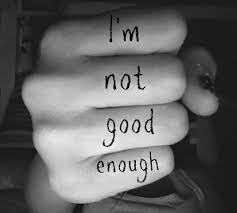Why do I always think "I'm not good enough"?
It's common for people to have moments of self-doubt and feel like they're not good enough.

This can be triggered by a variety of factors, such as comparing ourselves to others, experiencing failure or rejection, or setting unrealistic standards for ourselves. It's important to remember that everyone has strengths and weaknesses, and it's okay to not be good at everything. It can be helpful to try to identify the specific thoughts or beliefs that are causing you to feel this way, and to challenge those thoughts with evidence or by seeking support from others. It's also important to be kind to yourself and to focus on your personal growth and progress, rather than dwelling on mistakes or shortcomings.
Identifying your strengths and weaknesses can help you better understand yourself, your motivations, and the things that come naturally to you. It can also help you set realistic goals for yourself and identify areas where you may need to work a little harder or seek support. Here are a few additional tips for identifying your strengths and weaknesses:
1. Be specific:
Instead of thinking in broad terms, try to identify specific skills or qualities that you excel at or struggle with. For example, instead of saying "I'm bad at math," you might say "I struggle with complex equations, but I'm good at understanding basic math concepts and solving everyday problems."
2. Keep an open mind:
It's important to approach this process with an open mind and be willing to consider the possibility that you may have strengths or weaknesses that you haven't fully recognized before. Don't be too quick to dismiss something as a weakness – consider whether it might just be an area that requires more effort or practice.
3. Be honest with yourself:
It can be tempting to only focus on your strengths or to downplay your weaknesses, but it's important to be honest with yourself in order to get an accurate picture of your skills and abilities. Try to be objective and consider both the positive and negative aspects of your personality and skills.
4. Seek support:
If you're having trouble identifying your strengths and weaknesses on your own, consider seeking the perspective of someone you trust, such as a friend, family member, mentor or therapist. They may be able to provide valuable insights and help you see things that you might have missed.






